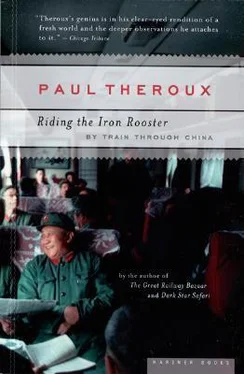It seems like proof to the Chinese that they are dealing with sentimental savages when Tibetans say the roads and schools are just another Chinese outrage. But that does not weaken the Chinese resolve — quite the opposite. It just means there is much more work to do in this benighted place, they say, echoing missionaries and colonizers and imperialists and encyclopedia salesmen the world over.
The Chinese have a fatal tendency to take themselves and their projects too seriously. In this they resemble some other evangelizing races, spreading the word and traveling the world to build churches, factories, or fast-food outlets — the intention may be different in each case but they are all impositions. What the evangelizer in his naive seriousness does not understand is that there are some people on earth who do not wish to be saved.
The Tibetans were too isolated to understand what a very great favor it was for them to be admitted to the Chinese world: that is the Chinese view. But it is plain that the Chinese are themselves isolated and do not understand how deeply their version of progress and modernity is hated by many sensible people. Partly this is due to their insensitivity and the clumsiness brought about by their isolation. But their seriousness doesn't help — nor does it mean they are particularly watchful or wise, since seriousness can often indicate that someone is vacant and stupid.
Not much opprobrium was ever attached to the Chinese invasion of Tibet. In one respect the rest of the world did not care greatly. The prevailing view was that the Chinese were possessed of a kind of wisdom. How could such people fail the Tibetans? But that view accepts the Chinese as inscrutable, and working out their solutions in mysterious ways.
I do not accept Chinese inscrutability. I think, like many people on earth, they are knowable, and they are a great deal more scrutable and obvious than most. Now the Tibetans know them much better and would probably agree (as I do) with Doctor Johnson who wrote 200 years ago, "The boundless panegyricks which have been lavished upon the Chinese learning, policy, and the arts, show with what power novelty attracts regard, and how naturally esteem swells into admiration. I am far from desiring to be numbered among the ex-aggerators of Chinese excellence."
Tibet is so underpopulated that the Chinese have relaxed their one-child policy for Tibetans — it is also practically unenforceable in such a wild place. And the emptiness of the country means that any crowd of people is a novelty. That is why the Lhasa market is so busy: many of the people are merely spectators who have come to Lhasa on a New Year's pilgrimage and can't get over the sight of fresh oranges and bananas or the hundreds of highly ornamented Kham men swapping beads and necklaces.
The Lhasa market was the most interesting one I saw in China, because the Chinese have found it impossible to regulate. As a consequence, the traders sell everything they can lay their hands on, at whatever price they can get. There is a lively trade in antiques — silver, pewter, semiprecious stones, knives, swords, saddles, horse brasses and harnesses, whips, rugs, carpets, and more Buddhist paraphernalia than you can shake a stick at. Some of the objects are copies. Many are fakes. Some are genuine. I was offered a silver charm box — a sort of sporran studded with jewels. Tibetan jewelry is heavy and often handsome. Enough tourists have come to Tibet for even these country folk to demand hundreds of dollars for their strings of coral and turquoise. After I bought a silver bowl from a young man he saw me as a serious customer and lifted up his robe, giving me a glimpse of an antique gold statue of Tara. Everyone had rare antiques stuffed up their cloaks and sleeves.
I walked from one end of Lhasa to the other. The distance was not great — just a few miles — but the altitude made it slow going. I went to the carpet factory, the tannery, the boot and shoe factory. The bazaar atmosphere of the free market made it seem much busier than any of these industries. The factories operated at half speed, with abundant tea breaks and giggling employees and work-in-stoppage — a far cry from the sweatshops of Canton and Shanghai.
There are no suburbs to Lhasa. Walk for fifteen minutes and you come either to the mountains or the river. A yak skin boat, a sort of unstable coracle, takes people across the river. On the other side there is a sandbank, a gravelly plain and more mountains.
An early European explorer to Tibet burst into tears when he saw one lovely mountain covered with snow. When I saw the landscape of Tibet that did not seem to me an odd reaction. The setting is more than touching — it is a bewitchment: the light, the air, the emptiness, the plains and peaks. Dusty crags and steep slopes surround Lhasa, and on some of the mornings I was there they were covered with snow from flurries in the night. Tibet has none of the winding roads and black cliffs of the Alps, nor the impenetrable and dangerous look of the Rockies. It is a safe and reassuring remoteness, with the prettiest meadows and moors buttressed by mountains. It was, somehow, a mountain landscape with few valleys — a blue and white plateau of tinkling yak bells and bright glaciers and tiny wildflowers. Who wouldn't burst into tears?
I got used to the smell of yak butter. It did not bother me that the Tibetans didn't wash.
"The water is too cold," Ralpa said.
"Of course," I said.
It was much harder for me to understand the fresh-air fiends in Harbin who chopped holes in the ice on the Sungari River and jumped in.
"They will get sick if they take baths," Ralpa said.
"Of course."
They were very dirty, but the cold pinched the smell, and it was so windy the stinks were academic. And Tibetans wore such gorgeous jewelry and furs and coiffures that they did not look dirty. In the end, the only thing I objected to were the fierce and rabid dogs, and in particular those mastiffs they called dhoki, guard dogs. I kept imagining myself riding a bike down these lovely roads on a long peregrination of Tibet, and the vision was interrupted by a mastiff lunging from behind a rock and messily dismembering me.
While I was in Tibet I read in a two-week-old China Daily that the politburo had met in Peking and decided that Lei Feng was still relevant as an example to Chinese youth. The politburo issued a statement saying that Lei Feng ought to be emulated. This made strange reading in Tibet.
Lei Feng was "the rustless screw." He was a model soldier and fervent Maoist who died after being crushed by a truck in 1962. No one had really known him; but after his death his diary was found and it showed him to be exemplary. He wrote how he reread and adored Mao's writings. He worked night and day, so he said. One night he went without sleep in order to wash a ton of cabbages. He did not stop there, but spent the early morning mopping floors.
In the diary (which some sceptical Chinese have called a forgery), Lei Feng wrote, "A man's usefulness to the revolutionary cause is like a screw in a machine. Though a screw is small, its use is beyond measure. I am willing to be a screw."
Twenty-five years later, Yu Qiuli, an important politburo member, said that what was needed in China today was more of "the Screw Spirit."
It was very hard to imagine a laughing Tibetan in his homemade fleece-lined coat with four-foot sleeves, his fantastic hat and boots, and red silk plaited into his hair, and his silver charm box and dagger, with jeweled earrings and ivory buttons, hollering at his dogs and gnawing bones and tying ribbons to his yaks — this freebooting man of the mountains — saying piously, "I am willing to be a screw."
It was even less likely that a Tibetan woman would be so submissive. No women in Asia were tougher or freer. Polyandry was still practiced in Tibet — some women had three or four husbands (the men were nearly always brothers). I could not imagine such a woman in blue coveralls, washing cabbages and losing sleep for the revolutionary cause.
Читать дальше












